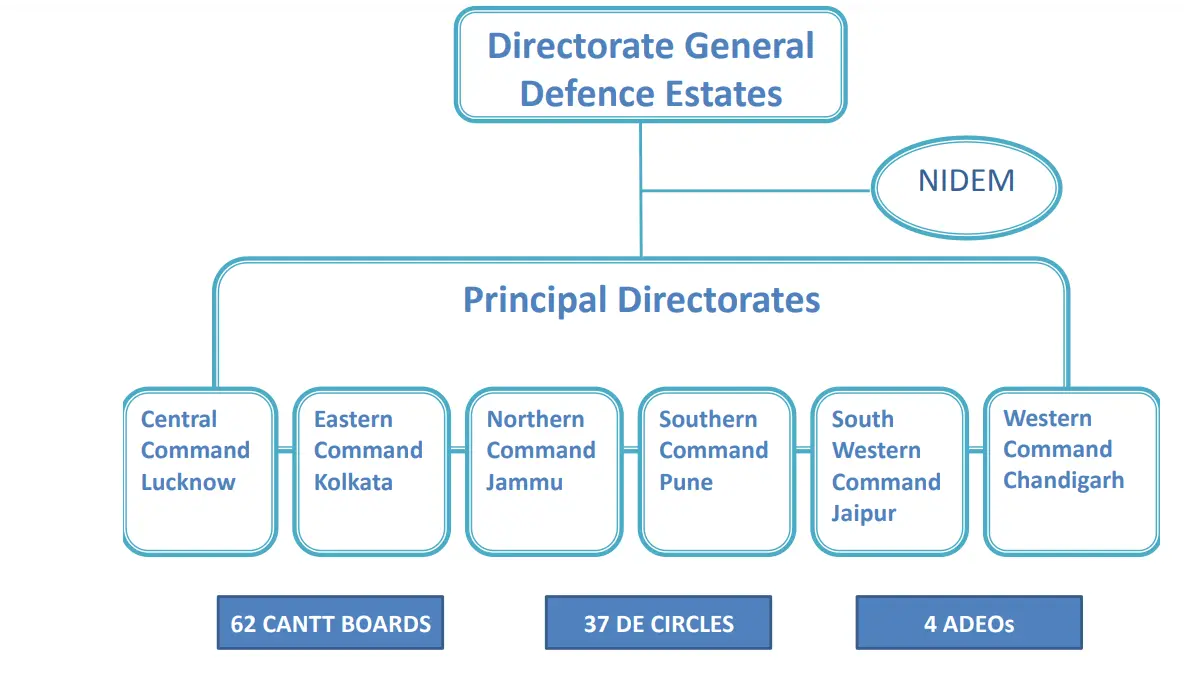The structure of the Service is 3 tiered, Apex level, Mid-level and Field level.
At the apex level is the Directorate General, located at Delhi Cantt. The officers in charge of the Directorate General are an IDES. The Senior Additional Director General is the only one (HAG). Moreover, there are four Additional Director Generals (SAG) who are in charge of different Divisions.
The middle level comprises the Directorates as Regional Headquarters supervising the
field offices. There are six Directorates, co-located with the six Army Commands. The Army commands are located at Lucknow, Pune, Jammu, Kolkata, Chandigarh and South-Western Command at Jaipur. All these Directorates are headed by the Principal Directors (HAG level) and assisted by the Directors (SAG level) and staff officers. All these officers are from the IDES service.
At the Field level, there are Chief Executive Officers in each of the 62 Cantonment Boards, Defense Estates Officers in each of the 37 Defence Estates Circles, and 04 Assistant Defence Estates Offices, all of which are at the forefront of administration.
Also, in Defence Estates Officers also works at the field level administration. DEOs are an agent of the Central Government in the domain of land management. CEO and DEO are IDES officers selected through UPSC CSE.
All IDES officers undergo a foundation training at LBSNAA are sent to National Institute of Defence Estates Management (NIDEM) in New Delhi for core training. NIDEM, a Central Training Institute was established in 1982 at Meerut Cantonment to function as a premier training institute for Indian Defence Estates Service Officers.
Currently, NIDEM’s first phase lasts for about 6 months before officers are deployed out into the field as CEOs or DEOs. Officers are summoned back to NIDEM for “End of probation training” at the end of the probationary period.
OTs are taught Parliamentary laws, Accounting principles, Civil Engineering principles, Electoral rules, VIP protocols and much more at NIDEM.
After completion of training, an OTs are generally given field postings and they start their career as CEO or DEO of any Cantonment area. As CEO you will be the Member -Secretary of the Cantonment Board. As a CEO, you will be responsible for healthcare services, education services, maintaining infrastructure, fixing and collecting tax, generating non-tax revenue, sanctioning plans and many more.
As a DEO, you will be given charge of circle comprising of supernumerary districts. As a DEO, you will have to surveying defence land for Army, Air Force and Navy, disbursing service charges- to Cantonment Boards, land acquisition, hire land for armed forces, renewing leases and licences and many more.
Below the designation list is attached
| S.No | Posts in Directorate | Posts in Directorate General | Time Scale | Pay Band | Grade |
|---|---|---|---|---|---|
| 1 | ————————— | Director General Defence Estates | Secretary level Post | 80,000 (Fixed) | Apex Scale |
| 2 | Principal Director | Sr. Addl. Director General | Higher Administrative Grade | 67,000 – 79,000 | —— |
| 3 | Director | Addl. Director General | Senior Administrative Grade | 37,400 – 67,000 | 10,000/- |
| 4 | Joint Director | Deputy Director General | Junior Administrative Grade (Selection) | 37,400 – 67,000 | 8,700/- |
| 5 | Joint Director | Deputy Director General | Junior Administration Grade (Ordinary) | 15,600 – 39,100 | 7,600/- |
| 6 | Deputy Director | Assistant Director General | Senior Time Scale | 15,600 – 39,100 | 6,600/- |
| 7 | Assistant Director | Assistant Director General | Junior Time Scale | 15,600 – 39,100 | 5,400/- |

Educrat IAS provides India’s & Kolkata’s best Mentorship for preparation of all services under Civil Services Examination (CSE). We provide extensive and holistic preparation to a small batch of sincere & dedicated UPSC Civil Servant aspirants who aspire & dream to become a part of the coveted Civil Services.
Trustindex verifies that the original source of the review is Google. I have joined the institute a few months ago and I can say this is best institution for preparation of UPSC exam.Joining this institute has been one of the best decisions of my UPSC journey.The coaching institute provides excellent guidance for UPSC aspirants with a well-structured curriculum.The teachers not only guide us academically but also keep us motivated during tough times.Faculty members are knowledgeable,approachable, and focus on conceptual clarity.Study materials and test series are comprehensive, updated, and exam-oriented. The institute also emphasizes answer writing, current affairs, and individual mentorship.Overall, it creates a motivating environment that boosts both preparation and confidence.If you want best guidance for UPSC exam,just join Educrat without any doubt.Just go for it..✨Trustindex verifies that the original source of the review is Google. Best coaching for UPSC preparation, amazing facilities and very friendly faculty members and teachers.Trustindex verifies that the original source of the review is Google. I have been studying in Educrat since 3 months & Educrat faculties are being extremely helpful in guiding me for my preparation. The institute has an extremely competitive environment. We have been provided with holistic & comprehensive study materialTrustindex verifies that the original source of the review is Google. Educrat has been a one stop solution for my UPSC preparation. Be it the GS papers, essay or my optional, Educrat has provided me guidance in the form of dedicated classes, 24*7 mentor access and relevant notes.Trustindex verifies that the original source of the review is Google. Best UPSC CSE coaching in Kolkata . Faculties are great and supportive.Trustindex verifies that the original source of the review is Google. Good Place to Study with Helpful Mentors and Friendly Study EnvironmentTrustindex verifies that the original source of the review is Google. Great institute for ias prep from Kolkata with customised mentorship.Google rating score: 4.9 of 5, based on 542 reviews
Copyright 2026 Educrat IAS Academy.
WhatsApp us